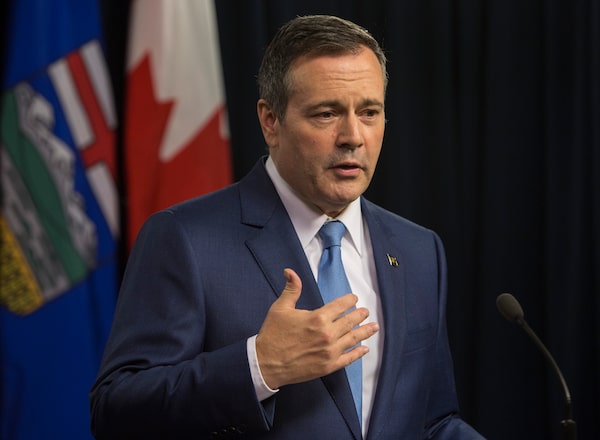
Alberta Premier Jason Kenney, seen here on Oct. 22, 2019, made eliminating Alberta’s carbon tax for consumers – on gasoline and home heating – a central pillar of the UCP platform.AMBER BRACKEN/The Canadian Press
On the eve of new Alberta legislation governing a carbon tax on large emitters, a group of energy sector bosses is working to swing the public opinion pendulum toward their industry’s emissions reduction message.
Details of Alberta’s Technology Innovation and Emissions Reduction (TIER) fund are set to be tabled in the provincial legislature Tuesday.
The program is expected to price emissions at $30 a tonne, with the first $100-million and half of the remaining cash paid into the fund used for emission-reduction projects including new technologies for oil sands extraction, and research and investment in carbon capture, utilization and storage.
The Alberta government is expecting TIER to bring in $1.9-billion over the next four years, $1.2-billion of which will fund emission reduction programs, according to last week’s budget.
Although large emitters in Alberta have been subject to a carbon tax for more than a decade, the program change was a key plank in Premier Jason Kenney’s election platform.
Initially, his United Conservative Party pegged the large emitter tax at $20 a tonne, but Mr. Kenney recently signalled it will remain at $30 – the same price under the previous NDP government’s Carbon Competitiveness Incentive Regulation (CCIR).
Mr. Kenney made eliminating Alberta’s carbon tax for consumers – on gasoline and home heating – a central pillar of the UCP platform.
The CCIR replaced the Specified Gas Emitters Regulation enacted in 2007, a Progressive Conservative program Mr. Kenney has long said he preferred. TIER will likely bring back SGER’s emissions-intensity targets, which vary by facility.
The focus on selling the emissions reduction message to Canadians is part of a pro-active push from the Business Council of Alberta (BCA), a group of around 50 CEOs established six months ago in the face of Alberta’s continued economic doldrums.
The province’s largest employers had little appetite for a co-ordinated business advocacy effort when Alberta was an economic powerhouse, but that all changed in the face of the oil price crash and resulting 2015 recession, tens of thousands of job losses and a sluggish recovery not expected to dramatically reverse its slump any time soon.
Scott Crockatt with BCA acknowledged that simply trying to convince Canadians their oil isn’t that bad isn’t a winning message.
“Where we have to go is for a bold new vision for Canadian energy that meets climate change commitments – the kind of vision that all Canadians can buy into – and pushes toward lower and lower emissions that are eventually net zero,” he said.
On Monday, BCA took its vision for the energy sector to Toronto’s Economic Club of Canada.
It employed the help of RBC vice-president John Stackhouse and Mac Van Wielingen, chair of Canada’s largest energy-focused private equity firm Arc Financial, to argue Canada needs a national energy strategy to set it apart on the global stage.
“Our customers are saying, ‘We want super high ESG [environmental social governance] standards and low carbon,’ and we have to embrace that,” Mr. Van Wielingen told The Globe and Mail.
“One of the main messages [Monday] was, ‘We hear you and we’re on it. We’re doing it.’ Most of the leaders in the major companies in Canada are committed, they’re onside and they’re trying to drive carbon as low as they can.”
We have a weekly Western Canada newsletter written by our B.C. and Alberta bureau chiefs, providing a comprehensive package of the news you need to know about the region and its place in the issues facing Canada. Sign up today.
 Emma Graney
Emma Graney